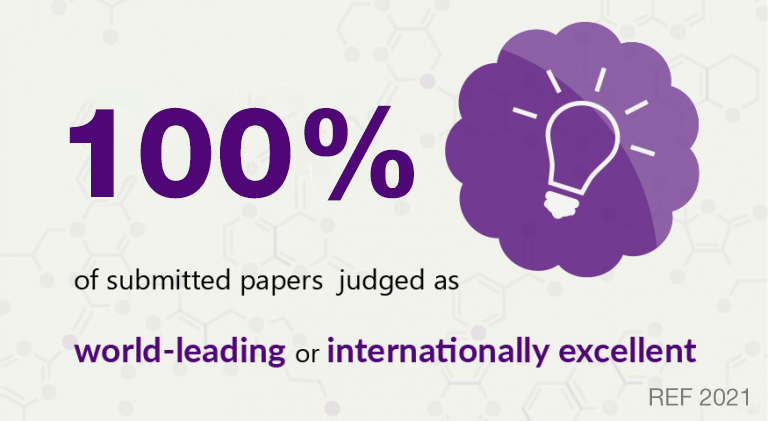MSc Chemical Research
Below are details about this programme for 2024 to 2025. Applications for September 2024 is open now. Further information about UCL graduate programmes can be found on the UCL Graduate degrees page. This programme is also accredited by the RSC (Royal Society of Chemistry).
Degree Structure:
Students develop a systematic approach to devising experiments and/or computations and gain familiarity with a broad range of synthetic, analytical and spectroscopic techniques, acquiring skills for the critical analysis of their experimental and computational observations. They also broaden their knowledge of chemistry through a selection of taught courses and are able to tailor the programme to meet their personal interests.
You will undertake Chemistry modules to the value of 180 credits.
Compulsory modules:
The programme consists of the following modules:
- Literature Project (30 credits)
- Research Project (90 credits)
- Transferable Skills for Scientist (15 credits)
Optional Modules:
In addition to the compulsory modules, students have a further THREE OPTIONS to complete their module selection:
Option A:
CHEM0079 Topics in Modern Chemistry (45 credits), choosing 6 x 7.5 credit topics
Option B:
CHEM0078 Topics in Modern Chemistry (30 credits), choosing 4 x 7.5 credit topics
AND EITHER CHEM0067 Advanced Topics in Environmental and Energy Materials (15 credits) OR CHEM0064 Simulation Methods in Materials Chemistry (15 credits).
Option C:
CHEM0077 Topics in Modern Chemistry (15 credits), choosing 2 x 7.5 credit topics
CHEM0067 Advanced Topics in Environmental and Energy Materials (15 credits)
CHEM0064 Simulation Methods in Materials Chemistry (15 credits)
NOTE: For the Topics in Modern Chemistry module, students choose topics from an extensive list of subjects in consultation with the programme director/research supervisor. These topics are aligned with programme aims and those of the individual research project and include topics from fundamental to applied chemistry. Topic areas include organic synthesis: asymmetric and biomimetic processes and the interface of chemistry with biology; inorganic/ materials chemistry: preparation and characterisation of catalysts and green chemistry; physical chemistry: fundamentals of gas and condensed phase processes and their applications and computational chemistry: ranging from data acquisition and analysis to fundamental quantum chemical calculations. Optional modules develop and may change - an illustrative selection of optional topics available is given below.
- Modern Characterisation Methods for Ordered / Disordered Materials
- X-ray Imaging and Microscopy/ Photoelectron Spectroscopy Techniques
- Preparation and Characterisation of Heterogeneous Catalysts/ Catalysis and Chemical Process Technology
- Green Chemistry, Renewable Energy Landscape and the Role of Nanomaterials
- Colloids and Microplastics in the Environment
- CO2 Capture, Storage and Utilisation
- Stereochemically-Controlled Synthesis/ Chiral Auxiliaries in Asymmetric Synthesis
- Catalytic Asymmetric Reactions
- Biosynthesis of Natural Products and Selected Aspects of Biocatalysis
- Carbohydrate Chemistry and Biomimetic and Prebiotic Chemistry
- Peptides, Proteins and Bioconjugation/ Nucleic Acids and Fluorescence Detection
- Chemical Crystallography/ NMR/ Mass Spectrometry
- Surface Science/ Advanced Solid State Chemistry
- Atmospheric Chemistry
- Scientific Computing and Data Analysis/ Bayesian Statistics and Maximum Entropy
- Data Acquisition, Processing and Analysis
- Monte Carlo Methods/ Approximate Methods in Quantum Mechanics
- Symmetry and Spectroscopy
- Advanced Experimental Skills
Please note that the list of modules given here is indicative. This information is published a long time in advance of enrolment and module content and availability is subject to change.
 Close
Close


